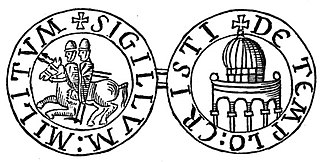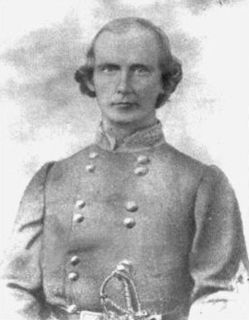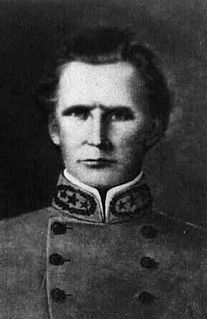Franklin Barlow Sexton (April 29, 1828 – May 15, 1900) was a politician from Texas who served in the Confederate Congress during the American Civil War.

Texas is the second largest state in the United States by both area and population. Geographically located in the South Central region of the country, Texas shares borders with the U.S. states of Louisiana to the east, Arkansas to the northeast, Oklahoma to the north, New Mexico to the west, and the Mexican states of Chihuahua, Coahuila, Nuevo León, and Tamaulipas to the southwest, while the Gulf of Mexico is to the southeast.

The American Civil War was a war fought in the United States from 1861 to 1865, between the North and the South. The Civil War is the most studied and written about episode in U.S. history. Primarily as a result of the long-standing controversy over the enslavement of black people, war broke out in April 1861 when secessionist forces attacked Fort Sumter in South Carolina shortly after Abraham Lincoln had been inaugurated as the President of the United States. The loyalists of the Union in the North proclaimed support for the Constitution. They faced secessionists of the Confederate States in the South, who advocated for states' rights to uphold slavery.
Sexton was born in New Harmony, Indiana, in rural Posey County, the only child of Dr. and Mrs. Samuel Sexton. In 1838, the family moved from Indiana and resettled in San Augustine, Texas. There, his father died when Franklin was 13 years old. Sexton briefly served as an apprentice to a local printer, and then enrolled in the local Methodist academy (Wesleyan College) and studied law. He was granted his license to practice law in 1848 by special legislative action. He established a legal practice in San Augustine and became active in local political circles. In 1852, he married Eliza Richardson, daughter of a prominent Sabine County landowner. The couple had 12 children. Sexton became a member of the Freemason movement, serving in 1856 as Grand Master.

New Harmony is a historic town on the Wabash River in Harmony Township, Posey County, Indiana. It lies 15 miles (24 km) north of Mount Vernon, the county seat, and is part of the Evansville metropolitan area. The town's population was 789 at the 2010 census.

Posey County is a county located in the southwestern corner of the U.S. state of Indiana. Its southern border is formed by the Ohio River, and the western border by the Wabash River, a tributary. As of 2010, the population was 25,910. The county seat is Mount Vernon.

San Augustine is the county seat city of San Augustine County, Texas, in East Texas, United States. The population was 2,108 at the 2010 census.
In April 1860, Sexton was elected as president of the Texas State Democratic Convention. He presided over the convention, which passed resolutions regarding states rights and reaffirming the institution of slavery. The following year, with the outbreak of the Civil War and Texas's secession, Sexton briefly joined the Confederate States Army, but resigned after being elected to fill a vacancy in the State Senate. In 1862, he was elected to the First Confederate Congress as a representative from Texas's 4th District and left home in July to travel to Richmond, Virginia, to assume his duties, arriving in mid-August. He worked with the War Department to improve the conditions of the average soldier in the field. Sexton was reelected to a second term in 1863, serving until the fall of the Confederacy in the spring of 1865 and the dissolution of the Congress. He was one of only two Texans to be elected to both terms.

Slavery is any system in which principles of property law are applied to people, allowing individuals to own, buy and sell other individuals, as a de jure form of property. A slave is unable to withdraw unilaterally from such an arrangement and works without remuneration. Many scholars now use the term chattel slavery to refer to this specific sense of legalised, de jure slavery. In a broader sense, however, the word slavery may also refer to any situation in which an individual is de facto forced to work against their own will. Scholars also use the more generic terms such as unfree labour or forced labour to refer to such situations. However, and especially under slavery in broader senses of the word, slaves may have some rights and protections according to laws or customs.
Secession is the withdrawal of a group from a larger entity, especially a political entity, but also from any organization, union or military alliance. Threats of secession can be a strategy for achieving more limited goals. It is, therefore, a process, which commences once a group proclaims the act of secession. It could involve a violent or peaceful process but these do not change the nature of the outcome, which is the creation of a new state or entity independent from the group or territory it seceded from.

The Confederate States Army (C.S.A.) was the military land force of the Confederate States of America (Confederacy) during the American Civil War (1861–1865), fighting against the United States forces. On February 28, 1861, the Provisional Confederate Congress established a provisional volunteer army and gave control over military operations and authority for mustering state forces and volunteers to the newly chosen Confederate president, Jefferson Davis. Davis was a graduate of the U.S. Military Academy, and colonel of a volunteer regiment during the Mexican–American War. He had also been a United States Senator from Mississippi and U.S. Secretary of War under President Franklin Pierce. On March 1, 1861, on behalf of the Confederate government, Davis assumed control of the military situation at Charleston, South Carolina, where South Carolina state militia besieged Fort Sumter in Charleston harbor, held by a small U.S. Army garrison. By March 1861, the Provisional Confederate Congress expanded the provisional forces and established a more permanent Confederate States Army.
Returning to San Augustine after the war, Sexton resumed his legal practice and involvement with the Masons. In 1870, served as Grand Commander of the Knights Templar of Texas. He moved his family to Marshall, Texas, in 1872 and established a profitable practice there representing the railroad. When the state authorized construction of a new Capitol building in Austin, Sexton was selected to deliver an address at the ceremony for the laying of the cornerstone. He was a delegate to the 1876 Democratic National Convention in St. Louis, where he made an impassioned speech supporting Samuel J. Tilden. After his wife died, Sexton moved in with one of his daughters at El Paso. He was appointed a judge on the state Supreme Court and later served as a United States commissioner.

The Poor Fellow-Soldiers of Christ and of the Temple of Solomon, also known as the Order of Solomon's Temple, the Knights Templar or simply the Templars, were a Catholic military order recognised in 1139 by the papal bull Omne datum optimum. The order was founded in 1119 and was active until 1312 when it was perpetually suppressed by Pope Clement V by the bull Vox in excelso.

Marshall is a city in and the county seat of Harrison County in northeastern Texas in the United States. Marshall is a major cultural and educational center in East Texas and the tri-state area. At the 2010 census, the population of Marshall was 23,523. The population of the Marshall Micropolitan Area, comprising all of Harrison County, was 65,631 in 2010.

Austin is the capital of the U.S. state of Texas and the seat of Travis County, with portions extending into Hays and Williamson counties. It is the 11th-most populous city in the United States and the 4th-most populous city in Texas. It is also the fastest growing large city in the United States, the second most populous state capital after Phoenix, Arizona, and the southernmost state capital in the contiguous United States. As of the U.S. Census Bureau's July 1, 2017 estimate, Austin had a population of 950,715 up from 790,491 at the 2010 census. The city is the cultural and economic center of the Austin–Round Rock metropolitan statistical area, which had an estimated population of 2,115,827 as of July 1, 2017. Located in Central Texas within the greater Texas Hill Country, it is home to numerous lakes, rivers, and waterways, including Lady Bird Lake and Lake Travis on the Colorado River, Barton Springs, McKinney Falls, and Lake Walter E. Long.
Sexton died in El Paso and was buried in Marshall, Texas.
In 1923, Sexton's diary recording his first two years in the Confederate Congress was discovered, providing a rare glimpse into the inner workings of that body.















